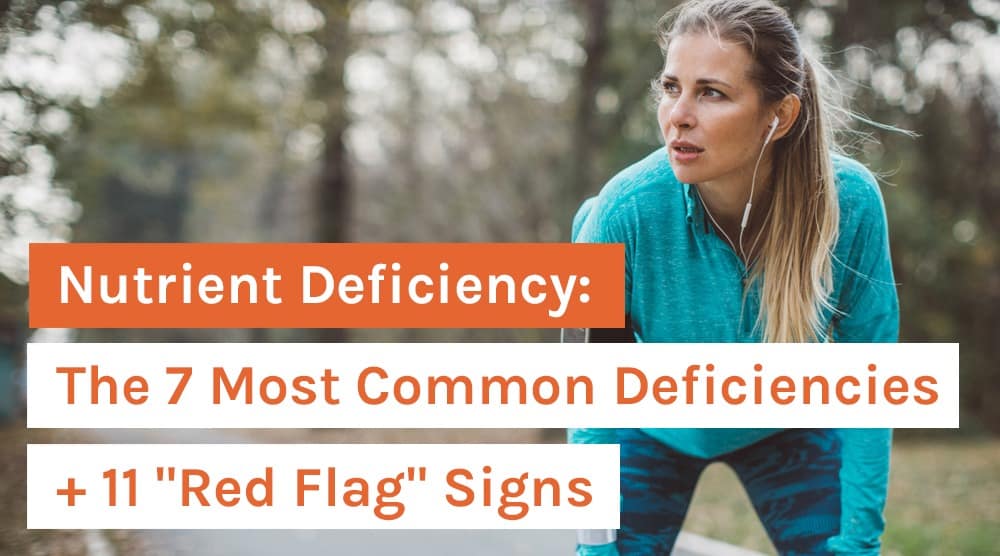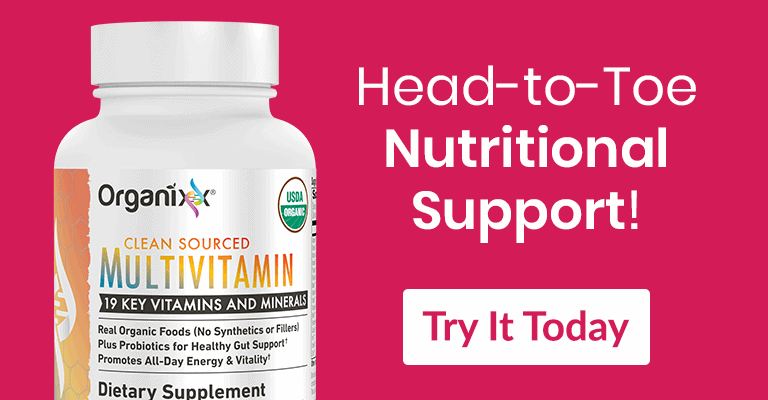Nutrient Deficiency: The 7 Most Common Deficiencies + 11 "Red Flag" Signs
In a hurry? Click here to read the Article Summary...
There was a time not too long ago when human beings were able to extract the majority (if not all) of the vital nutrients we needed for good health from the food we ate and our outdoor-focused, active lifestyles.
It is a sad fact that in these modern times, this is no longer the case. In fact, a 2006 study published in the Journal of the International Society of Sports Nutrition found that food alone doesn’t cut it when it comes to getting all the nutrients the body needs. Of the 70 healthy athletes analyzed by the study researchers, every one of them was deficient in at least three essential vitamins or minerals.
If top athletes (who are oftentimes obsessed with good nutrition) can become nutrient-deficient… what does that say for the rest of us today?
The 7 Most Common Nutrient Deficiencies in the World
Ironically, the nutrients we’re most deficient in are also some of the ones that are the most important for overall health. Here is a brief rundown of what they are and what they do:

#1 – Iron.
According to the World Health Organization (WHO), the most common nutrient deficiency in the world is iron deficiency, as well as the number one cause of anemia in women and children.
Iron is a necessary component of hemoglobin in blood; this substance is what transports oxygen from the lungs via the circulatory system. On the other hand, studies have shown that too much iron may raise your risk of cancer and heart disease.
Experts recommend that individuals who think they may be iron-deficient first consider getting a serum ferritin test. Recommended safe levels are usually between 40 and 60 ng/ml.
#2 – Vitamin E.
According to a 2009 report from the U.S. Department of Agriculture (USDA), a whopping 86% of the American population does not meet the U.S. recommended daily allowance (RDA) for vitamin E. [In perplexing contrast to this government data, diagnosed cases of vitamin E deficiency – i.e., α-tocopherol concentrations of less than 12 μmol/L (516 μg/dL) in adults – is rare.]
Vitamin E is a nutrient that is found in many foods, such as avocados, broccoli, and almonds. In the body, it acts as a powerful antioxidant and immune system booster. Vitamin E is also the “ambassador and translator” for cells, helping them to communicate effectively with one another.
#3 – Vitamin A.
Vitamin A is essential for healthy skin, teeth, bones, and vision. Most importantly, however, vitamin A helps to maintain the integrity of cellular membranes.
Beta-Carotene, the “pre-vitamin” for vitamin A, comes from fruits and vegetables as well as in quality multivitamins. In order for the conversion process from beta-Carotene to retinol (the absorbable form of vitamin A) to occur, a person needs a strong digestive tract and a healthy gallbladder.
According to data from the World Health Organization (WHO), vitamin A deficiency is the leading cause of blindness in children worldwide.
#4 – Vitamin D.
Vitamin D gets a lot of press these days, linking it to breast cancer prevention. The American Association for Cancer Research (AACR) reported back in 2008 on a meta-analysis of four studies examining the link between vitamin D levels in the blood and breast cancer risk. One study found that sufficient levels of vitamin D led to an 80% reduction in breast cancer!
As reported by the AACR:
“An inverse association was observed between serum 25-hydroxyvitamin D [25(OH)D] levels and risk of female breast cancer in four recent observational studies. However, the exact 25(OH)D serum levels associated with a specific level of reduction in breast cancer incidence are still imprecise.”
Vitamin D, which is more of a hormone than a vitamin, is essential for health in other ways, too – especially as a helper for other vitamins. For instance, vitamin D is intricately connected to the absorption of vitamin A, vitamin K, and calcium.
The current worldwide epidemic of vitamin D deficiency is caused in part by our modern work and lifestyle choices, which do not leave much time for enjoying the sun outdoors.
#5 – Magnesium.
The latest studies suggest that roughly 68% of all Americans are deficient in magnesium, and up to 20% may suffer from severe deficiency.
The list of essential functions in the body that magnesium is responsible for is long. It includes:
- Nerve and muscle function
- Genetic synthesis
- Energy production and balancing
- Absorption of other key nutrients like iodine and vitamin C
- Hormonal health
- Sleep quality
- Protection from heavy metals like mercury and aluminum
Magnesium deficiency has been linked in studies to a higher risk of cancer, as well as cognitive breakdown and heart disease.
#6 – Vitamin C.
When you were a kid, you probably heard someone in your family say, “Come take your vitamin C!” whenever you had a cold. That advice wasn’t that far off. Vitamin C (camu camu is a potent and bioavailable plant-based source of vitamin C) is a necessary nutrient for immune system health. It is also important for the cardiovascular system since it is needed for the absorption of iron from food.
Vitamin C is also a powerful antioxidant, which helps in the formation of collagen and wound healing. Surveys from the U.S. and Britain found that vitamin C deficiency occurs in 1 in 5 men and 1 in 9 women.
A 2004 report by the American Centers for Disease Control stated that vitamin C “may be the most important water-soluble antioxidant in human plasma” and that 13% of Americans are notably deficient in it.
Vitamin C must come from either food or supplementation; the body does not create vitamin C on its own.
#7 – Vitamin B12.
There are 8 B vitamins in all, and all of them combined influence just about every single mechanism in the body. Getting enough vitamin B12 is especially important for the nervous system and brain health.
According to researchers at Tufts University, about 40% of adults have B12 levels below the normal range. Deficiency in this vital nutrient can lead to depression and other mental disorders, loss of the senses like taste and smell, cognitive decline, anemia, neuropathy in the hands and feet, and cardiovascular issues.
Deficiencies in other B vitamins, such as B1, B2, and B6, are also quite common.
Why Are We So Deficient in Key Nutrients?
The body needs essential vitamins and minerals to complete the thousands of second-by-second functions it performs for health. Everything from maintaining good gut balance to keeping your heart pumping is reliant on the efficient breakdown and use of nutrients.
“I eat a healthy diet,” you may be thinking, “so I have nothing to worry about, right?”
There was a time when this was true, but no longer. Even if you are someone who eats healthy, organic food every day, you can still have nutrient deficiencies.
First of all, because of poor soil, contaminants in the air and water, and an increasingly genetically modified food supply, the nutrient load of most produce is significantly less than it used to be.
A report published in 2004 by the University of Texas studied the nutritional value of 40 common fruits and vegetables grown in the U.S. between 1950 and 1999. What they found was shocking.
Over those 40 years, all of the foods they studied had “reliable declines” in key nutrients, including calcium, iron, vitamin C, and B vitamins.
The second reason has to do with malabsorption of nutrients within the body itself. Even if you are consuming great quantities of key essential nutrients, your body may not be able to absorb them properly in order to put them to work in your body.
The Most Common Causes of Nutrient Malabsorption
- Genetic dispositions (and environmental triggers that kick them into gear)
- Issues with methylation
- Issues with detoxification pathways
- Imbalances within the digestive tract itself
- A combination of these factors and others
All of these factors, including the expression of your genes, are influenced by one thing: lifestyle.
Diet, stress level, exercise level, hydration levels, and the quality of any supplements you are taking all play a part in malabsorption.
The last factor – gut imbalances largely caused by eating a SAD diet (standard American diet) – is probably the most common reason why nutrient malabsorption occurs.
11 Signs You May Have a Nutrient Deficiency
 Nutritional deficiency tests, including blood, saliva, and urine tests, can be very beneficial in letting you know if you are low in a particular vitamin or mineral.
Nutritional deficiency tests, including blood, saliva, and urine tests, can be very beneficial in letting you know if you are low in a particular vitamin or mineral.
But before you ever send anything to the lab, sometimes you can determine if you have a dietary deficiency by watching for nutrient deficiency symptoms and signs in your own body.
Do You Have Any “Red Flags” for Nutrient Deficiencies?
According to functional nutritionist and best-selling author Dr. David Jockers, as well as other experts, the following symptoms may be “red flags” for nutritional deficiencies:
- Hair loss
- Discoloration or ridges on nails
- Dark circles under the eyes
- Skin rash or acne that persists
- Periodontal disease
- Sores on the mouth
- Tingling or other sensations in the extremities
- Brain fog and other cognitive dysfunction, such as memory loss
- Loss of sexual drive/libido
- Depression and/or lethargy
- Ongoing fatigue
If You Decide to Supplement, Choose Only the Best
Once you’ve determined you have a nutrient deficiency, the likely next step is supplementation. When deciding on a supplement manufacturer, be aware that many companies still use synthetic ingredients and chemical additives to keep costs (and quality) down.
In fact, it is estimated that up to 95% of all vitamin and mineral supplements out there are at least partially created using synthetic materials!
The happy news is that consumer demand is growing for quality products that utilize the very latest in natural health technology.
If you decide that supplementation in one or more key nutrients is right for you, be sure to do your homework. Choose a whole-food brand that is organic and tests its products regularly for toxins, including heavy metals and pesticides, such as Organixx Multi-Vita-Maxx.
Organixx USDA Certified Organic Clean Sourced Multivitamin is a 100% non-synthetic, whole-food-based multivitamin made with organic botanicals — including patented VegD3® and Orgen-Him® blends — designed to deliver daily nutrition with exceptional purity, absorption, and digestive ease.
Unlike conventional multivitamins, every vitamin, mineral, and botanical in Multi-Vita-Maxx is sourced from real food – never synthetic isolates – so your body recognizes and uses it more effectively.

 Sources:
Sources:
Article Summary
7 most common nutrient deficiencies:
- Iron
- Vitamin E
- Vitamin A
- Vitamin D
- Magnesium
- Vitamin C
- Vitamin B12
Nutrient deficiency symptoms:
- hair loss
- discoloration or ridges on nails
- dark circles under the eyes
- skin rash or acne that persists
- periodontal disease
- sores on the mouth
- tingling or other sensations in the extremities
- brain fog and other cognitive dysfunction, such as memory loss
- loss of sexual drive/ libido
- depression and/or lethargy
- ongoing fatigue
Supplementation is a great way to combat nutrient deficiency but look for high-quality, whole-food-based supplements such as Organixx Multi-Vita-Maxx.





I take several supplements daily - all from Organixx. Yes, it costs a bit more than the pharmacy supplements, but you get what you pay for. I eat small amounts of food daily and feel I don't get enough of the necessary vitamins and the supplements help a lot. I highly recommend Organixx - I prefer anything that goes into my body be organic. Organixx' products are of high quality and I recommend them.
Doesn't the body also need vitamin K to help absorb vitamin D3?
Hi Deborah Killoran,
I appreciate your question regarding the relationship between Vitamin D and K2 and I'll do my best to provide you with an answer.
While there is a relationship between Vitamin D and K2, it has to do with calcium metabolism and not necessarily needing each other for absorption.
For instance, vitamin D3 is essential for efficient absorption of calcium and phosphate, both of which are needed for bone growth and maintaining bone strength.
Similarly, vitamin K2 allows calcium to enter into the bone where it is needed, instead of remaining in the blood where it can cause problems - for example, arterial calcification.
In other words, vitamins D3 and K2 work together to enable calcium to function efficiently in our body. So, it is a good idea to have Vitamin K2 in your diet as well. Remember, both D3 and K2 are fat-soluble vitamins, meaning that they do not dissolve in water and are absorbed best into your body when consumed with high-fat foods. For this reason, it's recommended to take vitamin D3 and K2 supplements with a meal containing healthy fats to enhance their absorption.
I hope you find this information helpful. Cheers to your good health! :)
i like it i take 3 capsules in the morning with food and 3 in the afternoon with and water my gut feel soo good. and take vitamin D before bed time thank you.
hi this is excellent topic clear and understanding and thank you for taking the time to write this. thank you again. ricky tangamaka the kiwi.
your product don't have a copper in it.so, what next?another lie.you are all B.S.